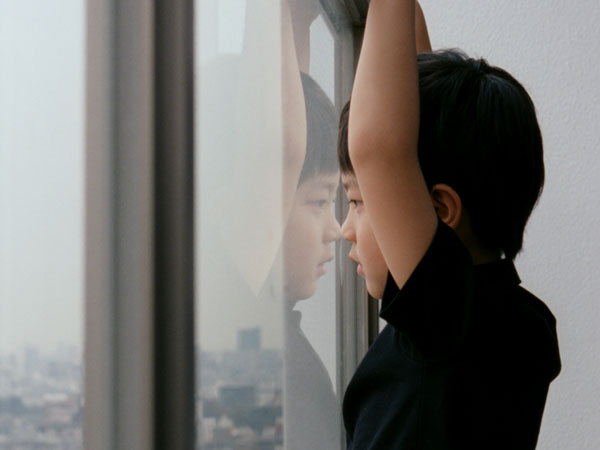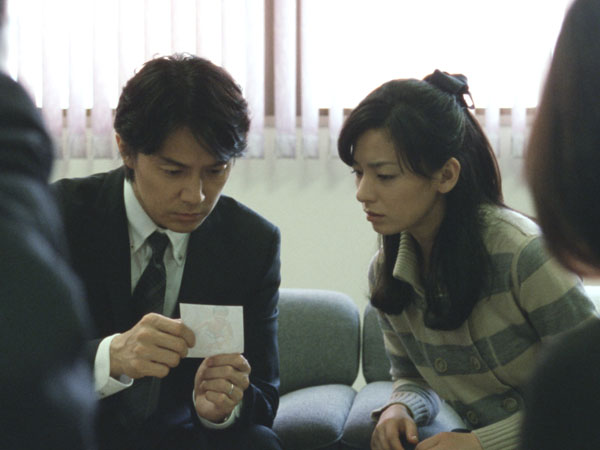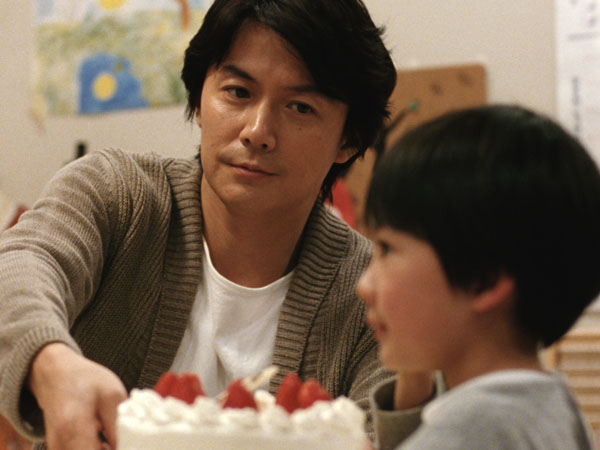“Hirokazu Kore-eda has returned to Cannes with another gentle and warm-hearted family drama in that classic Japanese manner that he has been gravitating towards in recent movies like Still Walking (2008) and I Wish (2011),” begins Peter Bradshaw in the Guardian. “It is a very decent piece of work, although not as distinctive as those two previous movies, not quite as finely observed and frankly a little schematic and formulaic, with life-lessons being learnt by the obvious people. It does however have charm and abundant human sympathy.”
Kore-eda’s films “are so relentlessly decent that to criticize them feels akin to stealing Christmas,” writes Guy Lodge for Time Out. “But a certain packaged preciousness is beginning to seep into Kore-eda’s work that wasn’t present in works like 2004’s Nobody Knows, and his latest, for all its careful construction and sweet pockets of feeling, is his glibbest and most morally one-sided film to date. The melodramatic premise is as old as the hills, which isn’t a problem in itself; it was good enough for Salman Rushdie’s Midnight’s Children, after all. Two baby boys… are switched at birth by a hospital nurse, and the parents must face the emotional fallout when the error is discovered six years later.”
“Trouble is,” writes Mike D’Angelo at the AV Club, “the movie follows precisely the path you’d expect, given that scenario, with predictable agonizing over whether blood (or DNA, more accurately) matters more than a bond long since established. Kore-eda shamelessly engineers a huge class division between the two couples, so that the wealthier parents feel an additional compulsion to ‘rescue’ their real son from his tacky, low-rent existence; even this aspect, however, ultimately feeds the maudlin primary story arc, in which the distant, disapproving rich dad (Fukuyama Masaharu) gradually learns the true importance of family and fatherhood. It’s nearly impossible not to respond on some level to material this emotionally freighted, and Kore-eda’s understanding of young children is typically astute (both boys take it in stride when informed they’ll be switching homes and parents, acting out later in more subtle ways), but Like Father, Like Son has the overall depth and tenor of a Lifetime movie.”
“Kore-eda has found a fresh perspective on this durable theme, and he surges into it like a child playing inside a duvet cover, feeling his way right to the corners,” counters the Telegraph‘s Robbie Collin. “Not only is [this] the best picture to be shown in competition so far, it also prompted the loudest reactions yet from this habitually noisy crowd: rippling laughter throughout, sustained applause at the close, and a steady refrain of goosey honks as attendees cleared their tear-streaming noses.”
On the other hand, Deborah Young in the Hollywood Reporter: “Though it’s packed with adorable tykes and more than a few strong scenes, even Kore-eda fans may feel a let-down with a lovely film that makes little emotional connection.”
Maggie Lee for Variety: “Mikiya Takimoto’s crisp lensing and beguilingly simple camera setups are complemented by the use of Bach’s Goldberg Variations to evoke a range of moods, from contemplative to light-hearted to somber.”
“Though the director is known for his contemplative film language, this particular film, with its fade to black edits and faithfulness to the plot, did not reveal any particular visual inventiveness,” writes Moira Sullivan for Film International.
“Evoking naturalistic performances from everyone involved (the kids are a pure delight), and with a welcome dose of humor, along with the requisite humanity he’s known for, Kore-Eda Hirokazu’s film is a touchingly low key, a wholly charming study of the evolution of parenthood.” The Playlist‘s Kevin Jagernauth gives it an A.
At Screen, Dan Fainaru agrees that “the youngsters [steal] the show from the adults every chance they get.”
The festival’s posted a recording of the press conference.
Updates, 5/19: “Kore-eda maintains his own formal rigor throughout, a choice that entirely counteracts all histrionics and melodrama,” writes Time Out New York‘s Keith Uhlich. “This is a relentlessly quiet character study that is photographed with Zen remove and scored metronomically to Bach and Beethoven, each scene clipped to the barest essentials…. The ensemble is spectacular… But the heart of the film is Fukuyama, who delineates every step of [architect Ryota Nonomiya’s] journey from grim disciplinarian to warm-hearted guardian with poignant concision. When the tears finally flow, the moment is more than earned—a grateful, graceful release.”
This is one of Kore-eda’s “most heartbreaking works yet,” agrees Jordan Cronk at the House Next Door. “Kore-eda spent much of his early career weathering comparisons to Ozu (his static camera compositions and familial predilections play at times like a direct tribute to the master himself), but over the years he’s finessed his compositional sense, developing a voice apart from not just his forebears, but a step more considered than most of his peers.”
“Kore-eda deftly examines a quietly moving nature vs. nurture sequence of events that manages to be generously moving despite feeling familiar when compared to other entries within Kore-eda’s impressive oeuvre,” writes Nicholas Bell at Ioncinema.
Barbara Scharres at RogerEbert.com: “Kore-eda’s plots are simple and direct; one could almost say childlike…. Typical of Kore-eda’s plot resolutions, the world of every one of his characters is expanded by embracing the family in its broadest possible definition.”
Updates, 5/20: “Like the driving concept of the film,” writes Daniel Kasman in the Notebook, “the extremes of economic and lifestyle differences between the parents always borders on exaggeration within the pared look of a quietly tracking camera (the influence of Hou’s cinematographer Mark Lee Ping-bin after his collaboration on Air Doll?) and expertly succinct decoupage. But the sentimentality that flows easily from the script glows within the mise en scène, leaving the characters understood but unjudged, the final effect like a good dessert: sweet but not too much so.”
Kieron Corless for Sight & Sound: “It can feel at times a shade too knowing, a bit too schematic in its narrative patternings, with a sense of couching some improving advice on how to live better.”
“We probably don’t need another film about a workaholic father who learns to stop and smell the roses,” grants Tim Grierson, writing for Paste, “but when it’s handled as effortlessly as Kore-eda does here, you remember that storytelling conventions exist for a reason: In the right hands, they can still work wonderfully.”
“If there’s any suspense here,” writes Wesley Morris at Grantland, “it stems from hoping the adults arrive at a civilized conclusion before they permanently wreck two families. No worries. They do. It’s not a Farhadi movie or anything. You just aren’t sure why it took two hours for them to work it out.”
Updates, 5/21: “The victim of his own sincere desire to tell a wholesome story, Kore-eda makes the situation feel real at the expense of making it involving for his audience,” finds Indiewire‘s Eric Kohn.
At Filmmaker, Chuck Tryon‘s “biggest reservation about the film was its suggestion that the poor—or working class—are inevitably happier and more fulfilled than the wealthy.”
Update, 5/25: Mary Corliss, too, writing for Time, has a problem with the parents falling “into convenient class categories: the arrogant yuppies and the soul-of-the-earth couple whose rude manners are an expression of their warm hearts. The bumpkin Yukari may speak with his mouth full and hope for a big settlement from the careless hospital, but he lavishes love on both boys and, needless to say, finds the time to go fly a kite. The children’s performances are winning, but the director’s dogmatic social scheme saps the dramatic tension in a film whose predictable message is: to be like a real father, you must connect with your son.”
Update, 5/26: Like Father, Like Son has won the Jury Prize.
Update, 5/27: Variety‘s Dave McNary reports that Sundance Selects has picked up US rights.
Cannes 2013 Index. And you can watch over 100 films that have seen their premieres in Cannes right here on Fandor. For news and tips throughout the day every day, follow @KeyframeDaily on Twitter and/or the RSS feed. Get Keyframe Daily in your inbox by signing in at fandor.com/daily.






